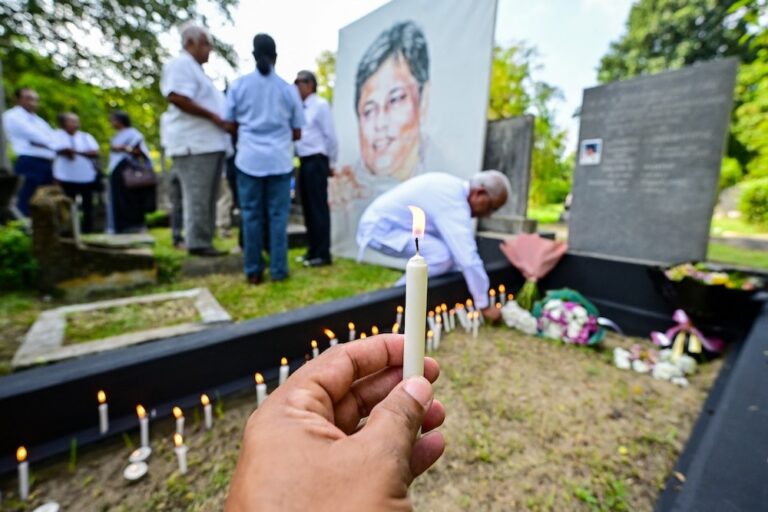(IFJ/IFEX) – May 11, 2009 – The International Federation of Journalists (IFJ) deplores the Sri Lankan Government’s continuing efforts to block free and independent media reporting from the country’s war zone, following the deportation of three British media workers on May 10. Reporter Nick Paton Walsh, producer Bessie Du and cameraman Matt Jasper, all of […]
(IFJ/IFEX) – May 11, 2009 – The International Federation of Journalists (IFJ) deplores the Sri Lankan Government’s continuing efforts to block free and independent media reporting from the country’s war zone, following the deportation of three British media workers on May 10.
Reporter Nick Paton Walsh, producer Bessie Du and cameraman Matt Jasper, all of Channel 4 News, were arrested in the eastern city of Trincomalee on May 9. The news team had been reporting independently on the war between government forces and the Liberation Tigers of Tamil Eelam (LTTE).
The IFJ calls on Sri Lanka’s Government to end its systematic efforts to prevent local and foreign media reporting on the war and the condition of civilians and refugees.
The IFJ draws the attention of the Government to United Nations Security Council Resolution 1738 (2006), which stresses the civilian status of journalists reporting in war zones and requires that governments protect them and “respect the professional independence and rights of journalists, media professionals and associated personnel as civilians”.
According to the Sri Lankan Government’s news website, P.B. Abeykoon, the Controller of Immigration and Emigration, said Walsh had consistently filed fabricated stories and had tarnished the country’s image.
Lakshman Hulugalle, the head of Sri Lanka’s Government Security Information Centre, said the Channel 4 journalists admitted they had “done something wrong” and would not be allowed back to Sri Lanka, according to news reports in Britain.
Walsh, Channel 4’s Asia correspondent, dismissed the statement as “complete rubbish”. He denied making a statement or admission to police, although authorities requested he do so.
Walsh said he believed the deportation of the news team was connected to his recent report on conditions for war refugees and alleged sexual abuse in refugee camps.
ITN News, which produces Channel 4, confirmed that Sri Lanka’s Defence Secretary, Gotabaya Rajapaksa, had ordered the team out of the country following its report on conditions in internment camps.
“Their original report, broadcast on Channel 4 News on 5 May 2009, contained the first independently filmed video from one of the internment camps in the city of Vavuniya in the north of Sri Lanka,” ITN said in a statement.
IFJ General Secretary Aidan White said, “The Government of Sri Lanka must recognise the professional rights of journalists to report independently and end its efforts to deny its citizens and the international community their right to know what is really going on in Sri Lanka.”
The deportation of the British team followed a warning by Abeykoon, reported in Sri Lankan media on April 30, that foreign journalists would be denied visas or deported if their reporting was not “balanced”. The department had already deported or denied visas to a large number of foreign journalists, he said.
“Any foreign journalist with good intentions and (who) practices balanced reporting however, is welcome in our country,” Abeykoon was quoted as saying.
The expulsion also came shortly after the Defence Secretary accused Britain’s Foreign Secretary, David Miliband, who visited Sri Lanka recently to encourage a ceasefire, of basing his views of the war on foreign news reports influenced by LTTE propaganda.


